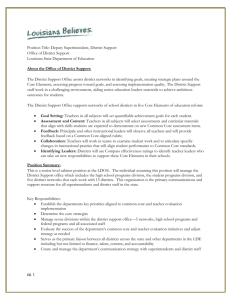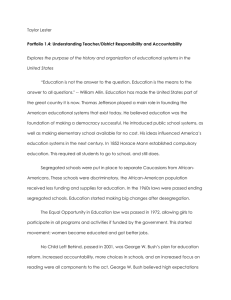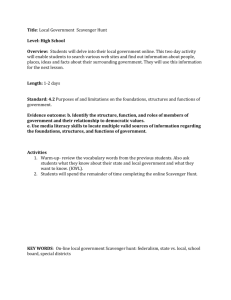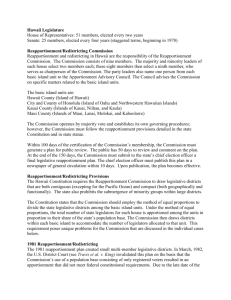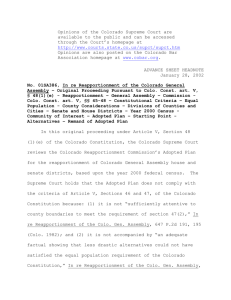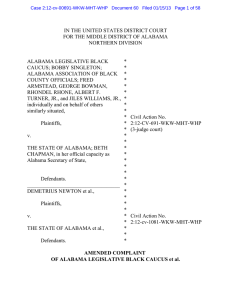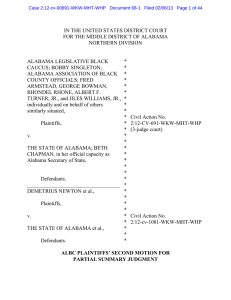CERT Reapportionment Introduction
advertisement
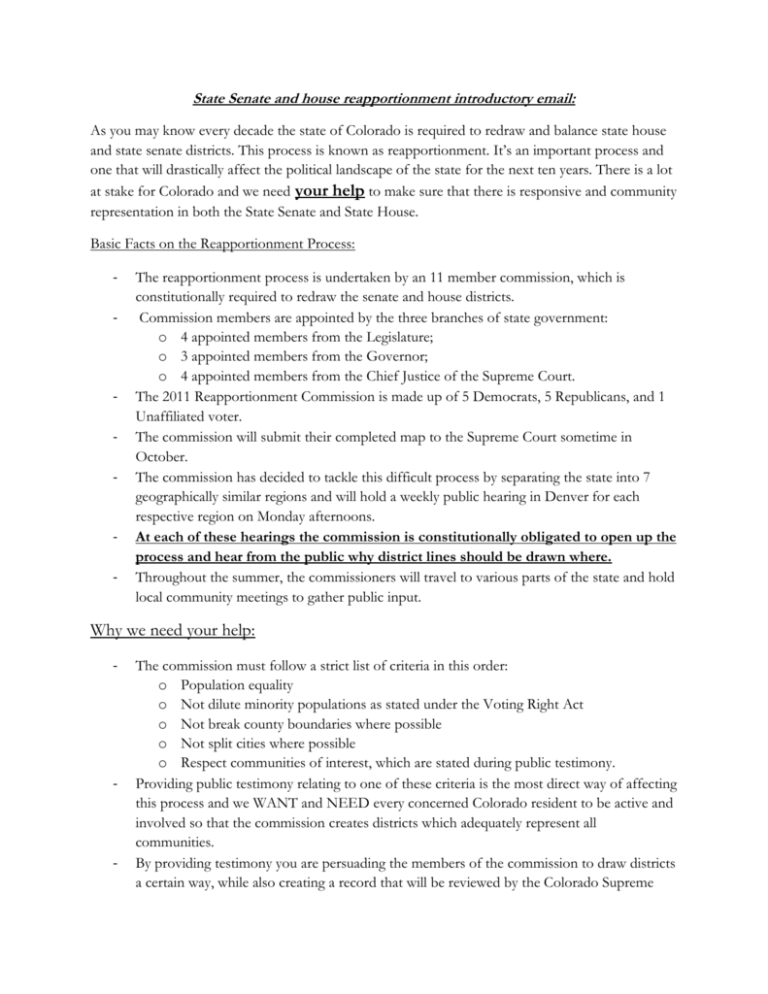
State Senate and house reapportionment introductory email: As you may know every decade the state of Colorado is required to redraw and balance state house and state senate districts. This process is known as reapportionment. It’s an important process and one that will drastically affect the political landscape of the state for the next ten years. There is a lot at stake for Colorado and we need your help to make sure that there is responsive and community representation in both the State Senate and State House. Basic Facts on the Reapportionment Process: - - - The reapportionment process is undertaken by an 11 member commission, which is constitutionally required to redraw the senate and house districts. Commission members are appointed by the three branches of state government: o 4 appointed members from the Legislature; o 3 appointed members from the Governor; o 4 appointed members from the Chief Justice of the Supreme Court. The 2011 Reapportionment Commission is made up of 5 Democrats, 5 Republicans, and 1 Unaffiliated voter. The commission will submit their completed map to the Supreme Court sometime in October. The commission has decided to tackle this difficult process by separating the state into 7 geographically similar regions and will hold a weekly public hearing in Denver for each respective region on Monday afternoons. At each of these hearings the commission is constitutionally obligated to open up the process and hear from the public why district lines should be drawn where. Throughout the summer, the commissioners will travel to various parts of the state and hold local community meetings to gather public input. Why we need your help: - - - The commission must follow a strict list of criteria in this order: o Population equality o Not dilute minority populations as stated under the Voting Right Act o Not break county boundaries where possible o Not split cities where possible o Respect communities of interest, which are stated during public testimony. Providing public testimony relating to one of these criteria is the most direct way of affecting this process and we WANT and NEED every concerned Colorado resident to be active and involved so that the commission creates districts which adequately represent all communities. By providing testimony you are persuading the members of the commission to draw districts a certain way, while also creating a record that will be reviewed by the Colorado Supreme Court to decide if the new districts are constitutional or not. THIS MEANS YOUR TESTIMONY IS INVALUEABLE. Where we need your help: Specifically, the hearing schedule for the commission is as follows: 1) Region 2 (Logan, Sedgwick, Phillips, Morgan, Washington, Yuma, Elbert, Kit Carson, Cheyenne, Lincoln, Crowley, Kiowa, Otero, Bent, Prowers, and Baca Counties) will be held this coming Monday, June 6th at 2:00pm 2) Region 3 (Moffat, Routt, Jackson, Rio Blanco, Garfield, Grand, Summit, Eagle, Pitkin, Lake, Mesa, Delta, Montrose, Gunnison, Ouray, San Miguel, Dolores, Montezuma, La Plata, San Juan, Hinsdale, Archuleta, and Chaffee Counties) will be held Monday, June 13th 3) Region 4 (El Paso, Douglas, Teller, Fremont, Park, Clear Creek, and Gilpin Counties) will be held Monday, June 20th 4) Region 5 (Larimer and Weld Counties) will be held on Monday June 27th 5) Region 6 (Adams, Boulder, Broomfield, and Jefferson Counties) will be held on Tuesday, July 5th 6) Region 7 (Arapahoe and Denver Counties) will be held on Monday, June 11th. All hearings will be held at the Legislative Services Building, Hearing Room A. Since the commission has decided to hold these hearings in Denver and knowing how difficult it is for folks from outside the metro area to attend they have opened up an email address to submit electronic testimony. This email is: reapp2011@state.co.us. We need help in arguing the attached talking points in a personal and effective way. This means using personal stories and demonstratives to illustrate why the districts within each region should be drawn to uphold progressive goals. 1) General Overarching Goals: Responsiveness In the state senate and state house Coloradans deserve competitive districts. In a fair and participatory democracy, State Senators and Representatives should be held responsible to their constituents through constant awareness and active knowledge of local issues. All of our collective civic engagement work has proven that competitive districts promote legislative responsibility and create an environment where local residents are empowered. Balancing districts, where possible, to be competitive imitates the diverse political landscape of Colorado and is something that should be considered during the reapportionment process. Rural county Cohesion: Rural counties depend on county-wide services more so than they depend upon individual town services. This is inherently due to the rural nature and low population density of the counties outside the metro area. The services, including health-care, low-income assistance, education, and more are a vital step in creating equal living opportunities for diverse and traditionally under-served communities. County boundaries will inevitably have to be compromised to balance population, but whenever possible rural county boundaries should remain intact. Hispanic Populations: The Hispanic population has grown substantially in Colorado over the past 10 years and the newly drawn state senate and house districts should represent this population shift. It is our goal to create as many “Hispanic Influenced Districts” around the state as possible. These are districts in which the Hispanic population is great enough to influence, and potentially elect, a candidate of their choice. This need not be areas in which the Hispanic population is over half, but simply those where the Hispanic population have enough of a presence to influence their representation. This exact percentage of the population differs depending on the region of the state.

